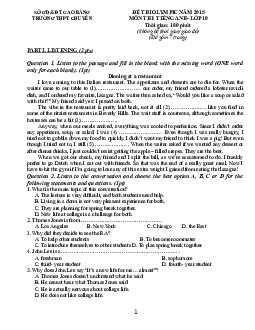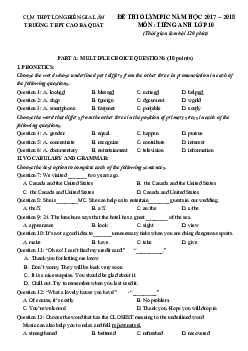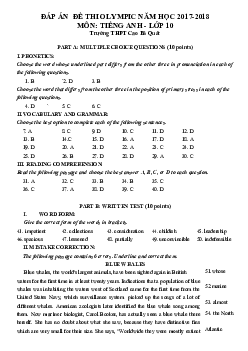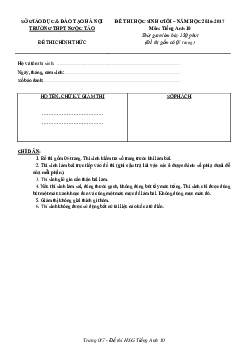








Preview text:
SỞ GD&ĐT HẢI DƯƠNG
KỲ THI NĂNG KHIẾU LẦN 1 TRƯỜNG THPT CHUYÊN NĂM HỌC 2020 - 2021 NGUYỄN TRÃI
MÔN: TIẾNG ANH KHỐI 10 CHUYÊN ĐỀ CHÍNH THỨC
Thời gian làm bài: 180 phút (không kể thời gian giao đề)
Ngày thi: 05 tháng 10 năm 2020 LISTENING: ( 20 POINTS)
I. You are going to listen to a talk about Student Coach Cards. As you listen, fill the missing words in
the blanks. Write NO MORE THAN THREE WORDS and/or NUMBERS taken from the recording for each
answer in the spaces provided. (10 pts)
If you are a student in (1) ______________ education or aged (2) ______________, you can get a
Student Coach Card for only (3) ______________. It will save you (4) ______________ standard fares
throughout Britain on National Express and Scottish City link services. You even get this (5) ______________
on Midweek Returns. It also entitles you to (6) ______________ some continental services and to discounts of
some Oxford City link and Invictaway services. A student Coach Card lasts for a full (7) ______________ with
no restrictions. You can get your Student Coach Card at (8) ______________, many national Express and
Scottish City link (9) ______________ by post simply by (10) ______________ the attached coupon. Your answers: 1. 2. 3. 4. 5. 6. 7. 8. 9. 10.
II.You will hear people talking in 5 situations. For questions 1-5, choose the best answer, A, B or C
1. You hear a man talking about a football match. Why was the match cancelled? A. because of the bad weather
B. because of football hooligans C. because of an accident
2. You hear someone talking on a mobile phone. Who is she talking to? A. a customer B. a colleague C. a relative
3. You overhear two people in a travel agent’s arguing about a trip. What do they disagree about? A. how warm it will be B. how sunny it will be C. how humid it will be
4. You hear a weather forecast on the radio. What will the weather be like tomorrow in the North? A. wet B. windy C. bright
5. Listen to this news report about a flood. What was the probable cause of the flood? A. a river bursting its banks B. a broken pipe C. heavy rainfall
Your answers: 1. 2. 3. 4. 5.
III. You will hear a man called Dan Pearman talking on the radio about Pedal Power-a UK charity which
sends bicycles to developing countries. Listen and decide the following sentences True (T) or False (F). (5points)
1. In 1993 Dan Pearman went to Ecuador as part of his studies.
2. Dan’s neighbor was successful in business because he found it easy to reach customers.
3. Dan says charities rely on getting enough bicycles to send regularly.
4. The town of Rivas has almost as many bikes as Amsterdam.
5. In August 2000, the charity was criticized in the British media. Your answers: 1. 2. 3. 4. 5.
SỞ GD&ĐT HẢI DƯƠNG
KỲ THI NĂNG KHIẾU LẦN 1 TRƯỜNG THPT CHUYÊN NĂM HỌC 2020 - 2021 NGUYỄN TRÃI
MÔN: TIẾNG ANH KHỐI 10 CHUYÊN ĐỀ CHÍNH THỨC
Thời gian làm bài: 180 phút (không kể thời gian giao đề)
Ngày thi: 05 tháng 10 năm 2020
Question 1. Choose the correct answer that best fits each blank. (10 points)
1. The main aim of the campaign is to raise …………..of the issue involved. A. knowledge B. awareness C. attention D. acquaintance
2. Thousands of antibiotics …………., but only about thirty are in common use today. A. are developing B. have been developing C. have developed D. have been developed
3. I’m going to……….this magazine ………..for now and read it later. A. put…on B. put….away C. put…aside D. put…together
4. John was the first person I saw …………hospital. A. by leaving B. on leaving C. in leaving D. on to leave
5. The newspaper is owned by the Mearson Group, ………….is Sir James Bex. A. which chairman B. whose chairman C. who chairman D. chairman
6. If he’s in trouble, it’s his own fault, I personally wouldn’t ………a finger to help him. A. lift B. turn C. bend D. raise
7. I …………..you can swim so well and I can’t. A. hate B. hate that C. hate it that D. hate it
8. She has asked me to ………..her sincere thanks to you for what you have done. A. report B. convey C. transfer D. confide
9. At ……………….time did I ever promise you a pay rise. A. no B. all C. any D. some
10. We visited ……………….last year.
A. a medical famous Scottish school
B. a famous medical Scottish school
C. a famous Scottish medical school
D. a Scottish famous medical school
11. Although the new library service has been very successful, its future is …………certain. A. by all means B. by no means C. by any chance D. at any rate
12. …………...you lend me your car, I won’t tell anybody your secret. A. As long as B. As far as C. In case D. Even if
13. - “Why do we need to get gas now? We have quite a bit left?”
- “This highway goes through some very empty country, and gas stations are ………”. A. at the drop of a hat B. a far cry from C. a fish out of water D. few and far between
14 .Although he didn’t have a ticket, Ken ………………come in. A. could B. can C. might D. was allowed to
15 If you go into the swamp, …………….alligators. A. look into B. look up C. look over D. look out for
16. Is it necessary that I ……………here tomorrow? A. will be B. am being C. be D. am
17. His change of job has …………… him with a new challenge in life. A. led B. initiated C. presented D. introduced
18. The teacher had the students …………… an essay on the positive and negative effects that modern technology has on children. A. to write B. to be written C. write D. writing
19. He said something about “green clouds”, but I haven’t the …………… idea what he meant. A. faintest B. darkest C. dimmest D. weakest
20 Don’t worry Harry! That creepy video is just a(n) …………… of fiction. A. piece B. feat C. work D. act
Question 2. Give the correct form of the words in parentheses. (5 points)
1. After his (expose) ………………….. to the cold for such a long time, he developed hypothermia.
2. (Disturb) ………………. of the ecological balance in nature tends to have far reaching consequences on human life.
3. Within the last few decades the computer has become the most (dispense) ....….. piece of equipment in the office.
4. She’s so (mind) ……………….. that she won’t let anything stand in the way of her ambition.
5. Beauty is in the eye of the (hold) ……………….. .
6. I don’t care if you had had too much to drink. Your behavior last night was quite (defend) ………… .
7. He’s so (decide) ………………..! He just can’t make up his mind.
8. Tom was accused of stealing some (confidence) ……………… documents.
9. No one wanted to (friend) …………… the obnoxious boy, so he was alone.
10. Tom spoke (breathe) ……………….. because he was so excited.
Question 3. Fill in each blank with a suitable PREPOSITION or PARTICLE. ( 5 points)
1. They set …………….for Paris at midnight.
2. She’s very nervous …………… the new boss.
3. I’m faithful………………. my principle.
4. Her latest novel is coming ………………….. in paperback soon.
5. Joan threw books and papers ……………the room whilst trying to find her passport and her cheque book.
6. According to a recent survey, most people are………….good terms with their neighbors.
7. I find it hard not to surrender ………….the temptation of having a chocolate ice-cream whenever I spend my time in the café.
8. My assistant will stand ………….for me while I’m away.
9. After a three month training period Celia gave up the nursing course ………….the grounds of having no
vocation for this kind of work.
10. The carpet is designed to stand up …………. a lot of wear and tear.
Question 4. The passage below contains TEN mistakes. Find the mistakes and then correct them. (10points) Line 1
Of the many unexplained phenomenon which continue to puzzle scientists and laymen like, the corn 2
circles of Southern England remain one of the most mysterious. These perfect-formed circles, 3
which, when they see from the air appear to have been inscribed with an enormous carving tool, 4
seem to be a part of a significant message; so far, however, nobody managed to decipher them, 5
and it is doubtful if anyone will ever be able to. But the main question – how the circles came to be 6
there – is just as far of being solved. Although several people had come forward claiming to have 7
made the circles themselves, scientists declare that it would be impossible for even a large group to 8
create shapes of such precision on so a large scale. These circles have become one of the strong 9
arguments in support of the existence of intelligent extra-terrestrial life forms.
Question 5. Read the text below and Fill in each blank with ONE suitable word. (5 points.) Speed limit
A recent proposal to limit the speed cars can reach is proving controversial. The idea, put (1) ________ by the
institute for Road Safety, involves (2) ___________ vehicles with a communications box containing a digital
map of the road network. When a car is in motion, the communications box – which knows how fast the vehicle
is(3)_________ permitted to travel on a particular section of road – automatically regulates the car’s speed. It
(4)__________ becomes impossible for a vehicle fitted with such a (5)_______ to exceed the speed limit.
There are plans to (6)_________ motorists to drive into the centre of major cities, and a communication box
could be used to identify vehicles that enter this zone. At present, each time a vehicle does so, its
number(7)___________ is photographed. Then the number is compared (8) __________ a list of authorized
vehicles, but this system is costly and (9)___________ from foolproof.
The system could be put in place quickly if the government wished as part the technology has already been
developed for another purpose. Electronic vehicle identification is (10) __________ with some people, who
regard it as an infringement of their rights. They would certainly object to a plan to restrict the limit of their cars,
which may make the government hesitate to go through with it .
Question 6 . Choose the word that best fits each gap. ( 5 points) Smart Dog!
Dogs are probably much clever than (1)……………. people think, scientists say. They are
(2)………………. that dogs can count and that the animals try to (3)………… different messages through the
pitch and pace of their barks. Animal behaviourists used to think their bark was simply a way of (4)…………….
attention. Now a new study suggests that individual dogs have (5)…………… barks with a range of meanings.
For example, dogs usually use high-pitched single barks when they are (6)…………… from their owners and a
lower, harsher super-bark when strangers (7)………….. towards them or the doorbell rings.
Dogs also know when they are receiving fewer treats because they have a basic mathematical ability
that (8)…………… them to tell when one pile of objects is bigger than another. But to count, an animal has to
recognize that each object in a set (9)………….. to a single number and that the last number in a (10)……………
represents the total number of objects. 1. A. mostly B. most of C. almost D. most 2. A. converted B. persuaded C. determined D. convinced 3. A. transfer B. convey C. bear D. suggest 4. A. paying B. attracting C. causing D. devoting 5. A. specific B. exact C. detailed D. specialized 6. A. split B. detached C. separated D. divided 7. A. approach B. appear C. draw D. move 8. A. assists B. facilitates C. enables D. informs 9. A. corresponds B. ties C. fits D. complements 10. A. sequence B. system C. progression D. succession
Question 7. Read the text below and then choose the best answer. ( 5 points)
Piracy began before the days of the Roman Empire when captured sailors and passengers were sold as
slaves. Around the sixteenth and the seventeenth centuries, piracy became legitimized when famous English
buccaneers were licensed by the government to attack Spanish fleets and merchant ships while Spain and
England were not at war. The hiring of pirates caught on because the governments had difficulty protecting
their ships and citizens from foreign pirates. In 1668, Sir Henry Morgan, one of the best known captains of a
conglomeration of pirate ships, practically declared a war on Jamaica. His lootings of Porto Bello, the Cuban
coast, Maracaibo, and Panama earned him his title and the post of lieutenant governor of Jamaica. Numerous
legends associated with his marine and coastal conquests have remained as part of the folklore both in England and in the Caribbean.
One of the most brutal pirates was Edward Teach, nicknamed “Blackbeard” for his long, thick beard,
which he tied back over his ears with a ribbon. After the war between England and Spain ended and his services
were no longer needed, he turned to piracy and terrorized the Virginia and Carolina coasts. In 1713, Teach lost
a marine battle between his ships and the Virginia fleet and was never heard from again.
Piracy vanished gradually with the onset of steam-powered seaboats that were too fast and too well equipped
for a pirate frigate to overtake. The last strongholds of piracy were Pacific islands and coastal havens where
boats with long galleys rowed by slaves engaged in plundering villages and capturing prisoners. British and
Dutch navy patrols finally did away with these enclaves in 1863. However, till this day, piracy can be a profitable
endeavor in remote parts of the world.
1. This passage is probably taken from a longer text on
A. plots and episodes in historical tragedies
B. marine treasures and excavations
C. the maritime history of England
D. illustrious characters in the coastal battles
2. It can be inferred from the passage that the English government
A. penalized pirates for crimes
B. employed pirates to its advantage
C. protected pirates as citizens
D. set out to control roving pirates
3. According to the passage, who was Captain Morgan? A. A mythological figure B. A famous salesman C. The governor of Jamaica D. A notorious buccaneer
4. The word “conglomeration” in bold is closest in meaning to A. flight B. fleet C. combination D. connection
5. It can be inferred from the passage that Morgan’s feats became part of
A. the English language B. the English heritage C. maritime attractions D. marine treasures
6. The word “brutal” in bold is closest in meaning to A. brave B. brusque C. cruel D. fashionable
7. According to the passage, Edward Teach
A. competed with Morgan for fame and fortune B. claimed portions of Virginia and Carolina
C. sought solace in the New World D. had been employed in war
8. The word “vanished” in bold is closest in meaning to A. disappeared B. dispersed C. vanquished D. valorized
9. The author of the passage implies that piracy A. provided plots for novels B. is universally condemned
C. has not been fully eradicated
D. has been completely absolved
10. The word “endeavor” in bold is closest in meaning to A. activity B. acumen C. adversity D. aggression
Question 8. Read the article and choose the sentence A - G which best summarizes each paragraph
(1-5) of the article. (5points). Example: [0] F
A. An old problem with serious consequences
B. Two new approaches, but can they solve the problem?
C. Experts say 'Bring back maths!' D. A potentially tragic error
E. Old methods are no longer satisfactory
F. We couldn't live without them G. But they are here to stay [0] ______
Our lives depend on computers. They control our money, transport, our exam results. Yet their
programs are now so complex that no one can get rid of all the mistakes. Life without computers has become
unimaginable. They are designed to look after so many boring but essential tasks - from microwave cooking to
flying across the Atlantic - that we have become dependent on them. [1] _______
But as the demands placed on computers grow, so have the number of incidents involving computer
errors. Now computer experts are warning that the traditional ways of building computer systems are just not
good enough to deal with complex tasks like flying planes or maintaining nuclear power stations. It is only a
matter of time before a computer-made catastrophe occurs. [2] _______
As early as 1889, a word entered the language that was to become all too familiar to computer
scientists: a 'bug', meaning a mistake. For decades bugs and 'de-bugging' were taken to be part of every
computer engineer's job. Everyone accepted that there would always be some mistakes in any new system.
But 'safety critical' systems that fly planes, drive trains or control nuclear power stations can have bugs that
could kill. This is obviously unacceptable. [3] _______
One way to stop bugs in computer systems is to get different teams of programmers to work in isolation
from each other. That way, runs the theory, they won't all make the same type of mistake when designing and
writing computer codes. In fact research shows that programmers think alike, have the same type of training -
and make similar mistakes. So even if they work separately, mistakes can still occur. Another technique is to
produce back up systems that start to operate when the first system fails. This has been used on everything
from the space shuttle to the A320 airbus, but unfortunately problems that cause one computer to fail can make all the others fail, too. [4] _______
A growing number of computer safety experts believe the time has come to stop trying to 'patch up'
computer systems. They say programmers have to learn to think clearly and to be able to demonstrate through
mathematical symbols that the program cannot go seriously wrong. Until programmers learn to do this, we will
probably just have to live with the results of computer bugs. [5] _______
Of course, more often than not the errors are just annoying, but sometimes they can come close to
causing tragedies. On the Picadilly line in London's Underground a driver who was going south along a track
got confused while moving his empty train through a cross-over point. He started to head north straight at a
south-bound train full of people. The computerized signaling system failed to warn him of impeding disaster
and it was only his quick human reactions that prevented a crash.
Question 10. Read the passage and do the tasks that follow. (5 points) A.
Besides the earth’s oceans, glacier ice is the largest source of water on earth. A glacier is a massive stream
or sheet of ice that moves underneath itself under the influence of gravity. Some glaciers travel down mountains
or valleys, while others spread across a large expanse of land. Heavily glaciated regions such as Greenland
and Antarctica are called continental glaciers. These two ice sheets encompass more than 95% of the
earth’s glacial ice. The Greenland ice sheet is almost 10,000 feet thick in some areas, and the weight of this
glacier is so heavy that much of the region has been depressed below sea level. Smaller glaciers that
occur at higher elevations are called alpine or valley glaciers. Another way of classifying glaciers is in terms
of their internal temperature. In temperate glaciers, the ice within the glacier is near its melting point.
Polar glaciers, in contrast, always maintain temperatures far below melting. B.
The majority of the earth’s glaciers are located near the poles, though glaciers exist on all continents,
including Africa and Oceania. The reason glaciers are generally formed in high alpine regions is that they
require cold temperature throughout the year, in these areas where there is little opportunity for summer
ablation (loss of mass), snow changes to compacted firm and then crystallized ice. During periods in which
melting and evaporation exceed the amount of snowfall, glaciers will retreat rather than progress. While glaciers
rely heavily on snowfall, other climatic conditions including freezing rain, avalanches and wind, contribute to
their growth. One year of below average precipitation can stunt the growth of a glacier tremendously. With the
rare 7 exception of surging glaciers, a common glacier flows about 10 inches per day in the summer and 5
inches per day in the winter. The fastest glacial surge on record occurred in 1953, when the Kutiah Glacier in
Pakistan grew more than 12 kilometers in three months. C.
The weight and pressure of ice accumulation causes glacier movement. Glaciers move out from under
themselves, via plastic deformation and basal slippage. First, the internal flow of ice crystals begins to spread
outward and downward from the thickened snow pack also known as the zone of accumulation. Next, the ice
along the ground surface begins to slip in the same direction. Seasonal thawing at the base of the glacier helps
to facilitate this slippage. The middle of a glacier moves faster than the sides and bottom because there is no
rock to cause friction. The upper part of a glacier rides on the ice below. As a glacier moves it carves out a U-
shaped valley to a riverbed, but with much steeper walls and flatter bottom. D.
Besides the extraordinary rivers of ice, glacial erosion creates other unique physical features in the
landscape such as horns, fjords, hanging valleys, and cirques. Most of these landforms do not become
visible until after glaciers have receded. Many are created by moraines, which occur at the sides and front
of a glacier. Moraines are formed when material is picked up along the way and deposited in a new location.
When many alpine glaciers occur on the same mountain, these moraines can create a horn. The matter horn,
in the Swiss Alps is one of the most famous horns. Fjords, which are very common in Norway, are coastal
valleys that fill with ocean water during a glacial retreat. Hanging valleys occur when two or more glacial valleys
intersect at varying elevations. It is common for waterfalls to connect the higher and lower hanging
valleys, such as in Yosemite National Park. A cirque is a large bowl-shaped valley that forms at the
front of a glacier. Cirques often have a lip on their down slope that is deep enough to hold small lakes when the ice melts away. E.
Glacier movement and shape shifting typically occur over hundreds of years. While presently about 10%
of the earth land is covered with glaciers, it is believed that during the last Ice Age glaciers covered
approximately 32% of the earth’s surface. In the past century, most glaciers have been retreating rather
flowing forward. It is unknown whether this glacial activity is due to human impact or natural causes, but
by studying glacier movement, and comparing climate and agricultural profiles over hundreds of years,
glaciologists can begin to understand environmental issues such as global warming.
Choose the most suitable heading for each paragraph I. Glacial continents
V. Glaciers through the years
II. Formation and growth of Glaciers VI. Types of Glaciers III. Glacial Movement
VII. Glacial Effects on Landscape
IV. Glaciers in the last Ice Age
VIII. Glaciers in National Parks
1. Paragraph A ………….
2. Paragraph B ………….
3. Paragraph C ………….
4. Paragraph D ………….
5. Paragraph E ………….
Write T (true), F (false) or NG (not given) before each statement
6. ………… Glaciers exist only near the north and south poles.
7. ………… Glaciers are formed by a combination of snow and other weather conditions.
8. ………… Glaciers normally move at a rate of about 5 to 10 inches a day.
9. ………… All parts of the glacier move at the same speed.
10. ………. During the last Ice Age, average temperatures were much lower than they are now.
Question 9. Finish each of the following sentences in such a way that it means exactly the sentence
before it. ( 5 points)
1. It was an impressive building but it wasn’t to my taste.
-> Impressive ………………………………………………………………………………………….
2. If Mike hadn’t been interested, the trip would have been cancelled.
-> But ………………………………………………………………………………………….
3. I left without saying goodbye as I didn’t want to disturb the meeting.
-> Rather than………………………………………………………………………………………….
4. She didn’t cry when the story ended in tragedy.
-> Not a tear ………………………………………………………………………………………
5. The population of the U.K has not expanded appreciably in the last decade.
-> There has been no …………………………………………………………………………………
Question 10. For each of the sentences below, write a new sentence as similar in meaning as possible
to the original sentence, using the word given in capital letters. This word must not be altered in any way. (5 points)
1.The new boss is not very popular with his employees. (take)
-> ……………………………………………………………………………………………
2. Tear gas was released as soon as the thieves touched the safe. (sooner)
->……………………………………………………………………………………………
3. Bruce said that the situation at work was like a family argument. (likened)
-> ……………………………………………………………………………………………
4. It is said that he was born in Segovia. (reputed)
-> ……………………………………………………………………………………………
5. I think you should be tolerant of other people’s weaknesses. (allowances)
-> ……………………………………………………………………………………………
Question 11. In about 120 words, write a paragraph about the changes that information technology
brings to your study.(15pts)




